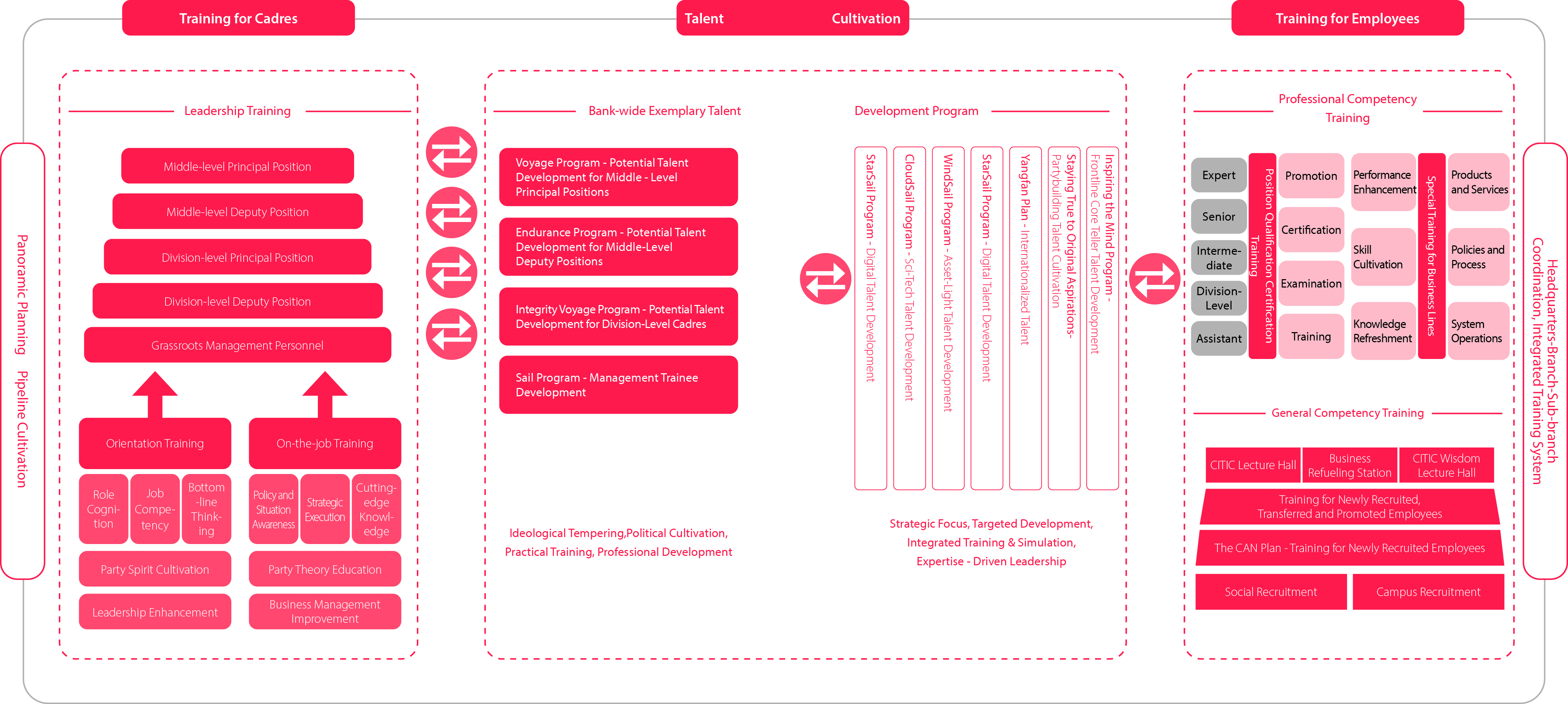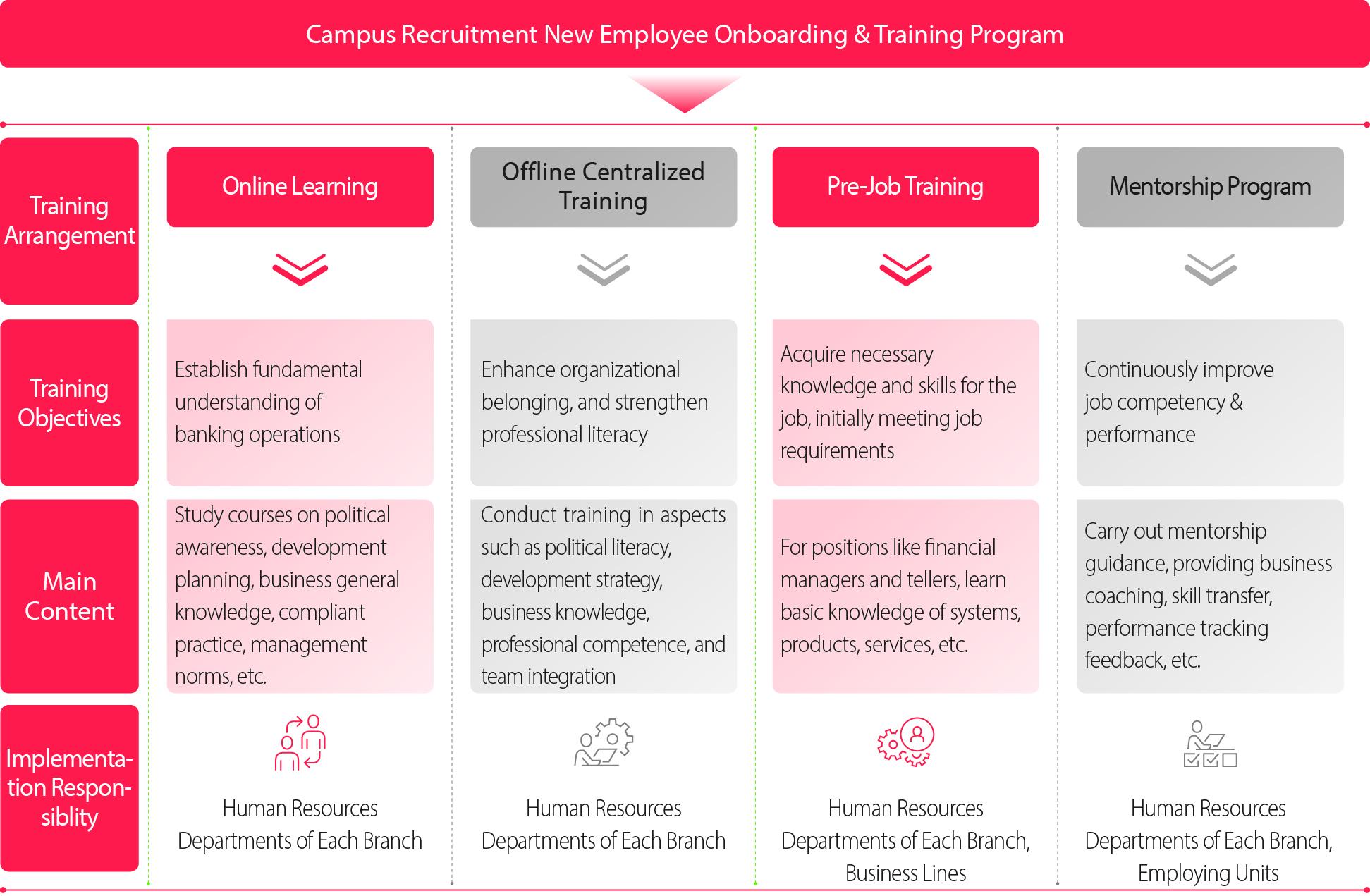Human Capital Development
Training and Development
The Bank continuously develops a multi-tiered training system, including a leadership-focused “orientation and on-the-job” training framework for managers at all levels, and professional and general competency training programs to enhance the business capabilities of all employees. Building on this, the Bank intensifies talent cultivation through Bank-wide exemplary programs targeting cadres and specialists, ensuring alignment with organizational and individual development goals.

1. Leadership Development Initiatives.
The Bank adheres to the standards of “political integrity, professional competence, and exemplary conduct” to cultivate a high-caliber, specialized financial cadre talent pool characterized by loyalty, integrity, and accountability. This is primarily achieved through the “orientation and on-the-job” cadre training system, which continuously strengthens leadership development for cadres at all levels.
Orientation Training: Nine training sessions were carried out for newly-appointed middle-level cadres, newly-appointed sub-branch managers, and newly-appointed section-level cadres. These training sessions effectively helped the newly-appointed cadres enhance their role awareness and improve their leadership and management qualities.
On-the-job Training: Focusing on the main theme, carried out centralized rotation training and Party spirit cultivation training centered around the spirit of the Third Plenary Session of the 20th Central Committee of the Communist Party of China and the spirit of the Central Financial Work Conference. This training covered more than 2,800 on-the-job cadres.
In 2024, the Bank selected a new cohort of middle-level principal potential talent under the “Voyage Program” and initiated their development, while intensifying the cultivation and practical training of middle-level deputy potential talent under the “Endurance Program” and division-level cadres potential talents under the “Integrity Voyage Program”. Tailored development programs were designed to systematically complete centralized training, online learning, research projects, and job rotation exchanges, continuously enhancing the political acumen, managerial capabilities, and practical skills of talents in the reserve pool.
2. Digital Capability Training
The Bank continues to advance digital capability training and talent development across three dimensions—mindset, skills, and expertise—to strengthen the enabling role of training in digital transformation. In 2024, the Bank launched the “Data Empowerment Initiative 3.0”, an online program to elevate digital thinking across the Bank. This initiative promotes deeper understanding of digital transformation by sharing successful case studies from industry leaders, thereby raising the Bank-wide “Data Quotient (DQ)”. To build business digital competencies, the Bank prioritizes the universalization of digital skills. A structured training system has been established, covering three modules: data analysis, data governance, and platform/tool applications. Eight offline and online “Digital Skills Bootcamps” were conducted, adopting an integrated “teach-learn-practice” approach to equip employees with foundational digital skills. Participants were also guided to identify practical application scenarios in their work, enhancing their digital application and management capabilities and further improving their “Data Skills (DS)”. Additionally, the Bank implemented the second phase of the “StarSail Program” for digital talent development, emphasizing the integration of training and real-world application to elevate participants' digital mindset and technical proficiency.
3. New Employee Training
The Bank actively conducts training programs for campus recruits and social hires, comprehensively covering corporate strategy, business fundamentals, compliance practices, and institutional norms to help new employees integrate swiftly into the corporate culture and their roles.
In 2024, the Bank upgraded its campus recruitment onboarding program to the “C.A.N. Plan (Version 2.0)”. This initiative includes 20 online courses (totaling 30 class hours) on essential knowledge and skills for new hires. For frontline employees, five mentoring manuals were developed for roles such as corporate client managers, wealth managers, and tellers, covering pre-job training and mentorship phases. An online mentorship management system was also launched. Through a structured blend of online learning, offline centralized training, pre-job preparation, and mentorship programs, the Bank accelerates the competency development of new employees.
The Bank’s Upgraded “C.A.N. Plan (Version 2.0)”
for Campus Recruitment Onboarding & Training

4. Internal Job Qualification Certification Training
The Bank has established a certification training and examination system for all employees. In 2024, the Bank restructured this system, creating a new framework encompassing 63 certification categories across ten major sectors: corporate banking, retail banking, financial markets, risk management, compliance, auditing, operations management, and information technology. The updated system provides online practical methodology courses tailored to employees’ actual work scenarios, further enhancing professional expertise and job performance capabilities. Throughout the year, two rounds of certification training and exams were conducted, involving 14,200 participants.
5. External Professional Qualification Certifications
The Bank encourages employees to pursue professional title evaluations, external vocational qualification certifications, and academic degree programs related to their roles during non-working hours.
Professional Title Evaluations: In 2024, 32 employees obtained senior professional titles through the CITIC Group Senior Professional Title Evaluation Committee, including 12 with Senior Professional Titles and 20 with Associate Senior Professional Titles.
External Vocational Qualification Certifications: In accordance with the Bank’s management policies for external vocational qualification examinations, employees who pass certifications listed in the Bank’s catalog are eligible for corresponding fee reimbursements. These policies apply to all employees (including full-time contract and dispatched workers), covering 68 certifications such as Chartered Financial Analyst (CFA), Financial Risk Manager (FRM), and Certified Public Accountant (CPA). In 2024, the Bank reimbursed certification fees for 3,136 employees.
6. University Collaborative Training
The Bank has established partnerships with 26 top-tier universities, including Peking University and Tsinghua University, leveraging external resources to provide diversified learning and training opportunities for employees. In 2024, the Bank collaborated with these institutions to organize 91 training programs for headquarters and branch management personnel, with 4,668 participants.
















